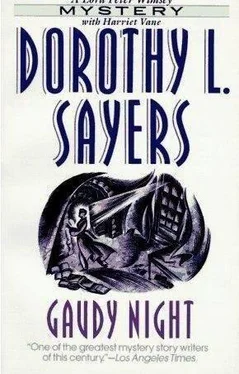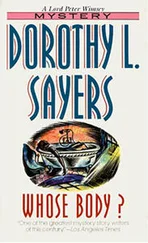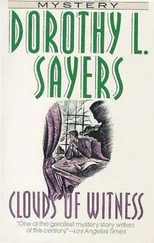Dorothy Sayers - Gaudy Night
Здесь есть возможность читать онлайн «Dorothy Sayers - Gaudy Night» весь текст электронной книги совершенно бесплатно (целиком полную версию без сокращений). В некоторых случаях можно слушать аудио, скачать через торрент в формате fb2 и присутствует краткое содержание. Жанр: Детектив, на английском языке. Описание произведения, (предисловие) а так же отзывы посетителей доступны на портале библиотеки ЛибКат.
- Название:Gaudy Night
- Автор:
- Жанр:
- Год:неизвестен
- ISBN:нет данных
- Рейтинг книги:4 / 5. Голосов: 2
-
Избранное:Добавить в избранное
- Отзывы:
-
Ваша оценка:
- 80
- 1
- 2
- 3
- 4
- 5
Gaudy Night: краткое содержание, описание и аннотация
Предлагаем к чтению аннотацию, описание, краткое содержание или предисловие (зависит от того, что написал сам автор книги «Gaudy Night»). Если вы не нашли необходимую информацию о книге — напишите в комментариях, мы постараемся отыскать её.
Gaudy Night — читать онлайн бесплатно полную книгу (весь текст) целиком
Ниже представлен текст книги, разбитый по страницам. Система сохранения места последней прочитанной страницы, позволяет с удобством читать онлайн бесплатно книгу «Gaudy Night», без необходимости каждый раз заново искать на чём Вы остановились. Поставьте закладку, и сможете в любой момент перейти на страницу, на которой закончили чтение.
Интервал:
Закладка:
“That is a very generous offer,” said the Warden. “We shall all be exceedingly grateful to you.”
“I ought to warn you,” said Harriet, “that one or two of the Senior Members do not approve of me.”
“That may make it a little more difficult. But if you are ready to put up with that unpleasantness in the interests of the College, it can only increase our sense of gratitude. I cannot too strongly emphasize how exceedingly important it is to avoid publicity. Nothing is more prejudicial to the College in particular and to University women in general than spiteful and ill-informed gossip in the press, The students, so far, seem to have been very loyal. If any of them had been indiscreet we should certainly have heard of it by now.”
“How about Miss Flaxman’s young man at New College?”
“Both he and Miss Flaxman have behaved quite well. At first, naturally, it was taken to be a purely personal matter. When the situation developed, I spoke to Miss Flaxman, and received her assurance that she and her fiancé would keep the whole thing to themselves until it could be properly cleared up.”
“I see,” said Harriet. “Well, we must do what we can. One thing I should like to suggest, and that is that some of the passage-lights should be left on at night. It is difficult enough to patrol a large set of buildings in the light: in the dark, it is impossible.”
“That is reasonable,” replied Dr. Baring. “I will speak to the Bursar about it.”
And with this unsatisfactory arrangement, Harriet was obliged to be content.
7
O my deare Cloris be not sad,
Nor with these Furies daunted,
But let these female fooles be mad,
With Hellish pride inchanted;
Let not thy noble thoughts descend
So low as their affections,
Whom neither counsell can amend,
Nor yet the Gods corrections.
– Michael Drayton
It was a matter of mild public interest at Shrewsbury College that Miss Harriet Vane, the well-known detective novelist, was spending a couple of weeks in College, while engaged in research at the Bodleian upon the life and works of Sheridan Le Fanu. The excuse was good enough; Harriet really was gathering material, in a leisurely way, for a study of Le Fanu, though the Bodleian was not, perhaps, the ideal source for it. But there must be some reason given for her presence, and Oxford is willing enough to believe that the Bodleian is the hub of the scholar’s universe. She was able to find enough references among the Periodical Publications to justify an optimistic answer to kindly inquiries about her progress; and if, in fact, she snoozed a good deal in the arms of Duke Humphrey by day, to make up for those hours of the night spent in snooping about the corridors, she was probably not the only person in Oxford to find the atmosphere of old leather and central heating favorable to slumber.
At the same time, she devoted a good many hours to establishing order among Miss Lydgate’s chaotic proofs. The introduction was re-written, and the obliterated passages restored, from the author’s capacious memory; the disfigured pages were replaced from fresh proof-sheets; fifty-nine errors and obscurities in the cross-references were eliminated; the rejoinder to Mr. Elkbottom was incorporated in the text and made more vigorous and conclusive; and the authorities at the Press began to speak quite hopefully about the date of publication.
Whether because Harriet’s night prowlings, or because the mere knowledge that the circle of suspects was so greatly narrowed, had intimidated the Poison-Pen, or from whatever cause, there were few outbreaks during the next few days. One tiresome episode was the complete stopping-up of the lavatory basin drain in the S.C.R. cloak-room. This was found to be due to some torn fragments of material, which had been rammed firmly down through the grid with the help of a fine rod, and which, when the plumber had got them out proved to be the remains of a pair of fabric gloves, stained with brown paint and quite unidentifiable as anybody’s property. Another was the noisy emergence of the missing Library keys from the interior of a roll of photographs which Miss Pyke had left for half an hour in one of the lecture-rooms before using them to illustrate some remarks about the Parthenon Frieze. Neither of these episodes led to any discovery.
The Senior Common Room behaved to Harriet with that scrupulous and impersonal respect for a person’s mission in life which the scholarly tradition imposes. It was clear to them that, once established as the official investigator, she must be allowed to investigate without interference. Nor did they hasten to her with protestations of innocence or cries of indignation. They treated the situation with a fine detachment, making little reference to it, and confining the conversation in Common Room to matters of general and University interest. In solemn and ritual order, they invited her to consume sherry or coffee in their rooms, and refrained from comment upon one another. Miss Barton, indeed, went out of her way to invite Harriet’s opinions upon Women in the Modern State and to consult her on the subject of conditions in Germany. It is true that she flatly disagreed with many of the opinions expressed, but only objectively and without personal rancour; the vexed subject of the amateur’s right to investigate crimes was decently shelved. Miss Hillyard also, setting aside animosity, took pains to interrogate Harriet about the technical aspect of such historical crimes as the murder of Sir Edmund Berry Godfrey and the alleged poisoning of Sir Thomas Overbury by the Countess of Essex. Such overtures might, of course, be policy; but Harriet was inclined to attribute them to a careful instinct for propriety.
With Miss de Vine she had many interesting conversations. The Fellow’s personality attracted and puzzled her very much. More than with any other of the dons, she felt that with Miss de Vine the devotion to the intellectual life was the result, not of the untroubled following of a natural or acquired bias, but of a powerful spiritual call, over-riding other possible tendencies and she felt inquisitive enough, without any prompting, about Miss de Vine’s past life; but inquiry was difficult, and she always emerged from an encounter with the feeling that she had told more than she had learnt. She could guess at a history of conflict; but she found it difficult to believe that Miss de Vine was unaware of her own repressions or unable to control them.
With a view to establishing friendly relations with the Junior Common Room Harriet further steeled herself to compose and deliver a “talk” on “Detection in Fact and Fiction” for a College literary society. This was perilous work. To the unfortunate case in which she had herself figured as the suspected party she naturally made no allusion; nor in the ensuing discussion was anybody so tactless as to mention it. The Wilvercombe murder was a different matter. There was no obvious reason why she should not tell the students about that, and it seemed unkind to deprive them of a legitimate thrill on the purely personal grounds that it was a bore to have to mention Peter Wimsey in every second sentence. Her exposition, though perhaps erring slightly on the dry and academic side, was received with hearty applause, and at the end of the meeting the Senior Student, one Miss Millbanks, invited her to coffee.
Miss Millbanks had her room in Queen Elizabeth, and had furnished it with a good deal of taste. She was a tall, elegant girl, obviously well-to-do, much better dressed than the majority of the students, and carrying her intellectual attainments easily. She held a minor scholarship without emoluments, declaring publicly that she was only a scholar because she would not be seen dead in the ridiculous short gown of a commoner. As alternatives to coffee, she offered Harriet the choice of madeira or a cocktail, politely regretting that the inadequacy of college arrangements made it impossible to provide ice for the shaker. Harriet, who disliked cocktails after dinner, and had consumed madeira and sherry on an almost wearisome number of occasions since her arrival in Oxford, accepted the coffee, and chuckled as cups and glasses were filled. Miss Millbanks inquired courteously what the joke was.
Читать дальшеИнтервал:
Закладка:
Похожие книги на «Gaudy Night»
Представляем Вашему вниманию похожие книги на «Gaudy Night» списком для выбора. Мы отобрали схожую по названию и смыслу литературу в надежде предоставить читателям больше вариантов отыскать новые, интересные, ещё непрочитанные произведения.
Обсуждение, отзывы о книге «Gaudy Night» и просто собственные мнения читателей. Оставьте ваши комментарии, напишите, что Вы думаете о произведении, его смысле или главных героях. Укажите что конкретно понравилось, а что нет, и почему Вы так считаете.












